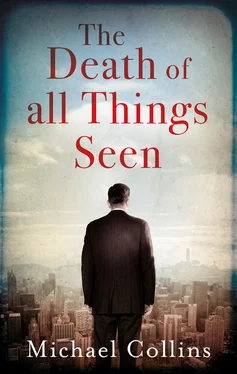He used a bathroom off to the side of the general store. He went in dribs and drabs. Blood in his urine clouded the bowl. He should see a doctor, but knew he wouldn’t.
Above him, a spider held a corner in the web of its own spun universe.
*
On the way out of town, Nate looked again at the letter. He set it beside him like a passenger come a long way. He would address the matter at home.
Ahead, snow fell in a soft, swirling veil that took on the opaque blue-grey of a bruise, the northern facing hills cast in deep cavernous shadow, the western sides a pale, butter yellow that had long since sent animals toward the instinctive drowse of hibernation.
He felt the same, drugged effect in the shunt of blood toward the vital organs. His hands and feet were always cold in a way they had not been years before. Maybe it was his age? He was undecided. He yawned into the back of his hand.
What he liked to watch on the television in his aloneness, in the deep freeze of winter, in the satellite beam of new choices, was reruns of Hawaii Five-0 — the azure sea and palm fronds, the scooping dig of island natives in the break of waves in their long canoes, and, of course, the immaculately dressed Jack Lord, the signature turn of his head at the show’s beginning. Jack Lord, a colonial viceroy, a man Nate connected with the calm, judicious equanimity of his own father.
How strange, the insistent drag of history, a show that could find him here alone and could breathe life into events connected to shots of his father in his time out on Midway Island in advance of the attack on Japan.
*
Nate opened the letter at the kitchen table. Helen Price had been known as The Other Woman , and before that as The Coat-check Girl , a title his mother had settled on in the early days.
There was a brief description of some film reels, recordings that had belonged to his father and that had come into the possession of Helen Price who had subsequently bequeathed them to Nate. In view of the reels’ age and fragility, the law office was seeking advice on how they should be sent.
Nate looked up into the gauze of falling snow, the world gone flat and two-dimensional. The letter was still in his hand. He looked down at it. His eyes adjusted to the glob of floating light and found their focus.
There was no indication of the content of the reels, or of how many there were, though what was significant, what could not be discounted, was that the reels had been kept all these years, and bequeathed, not through the execution of his father’s will, but through his father’s mistress, Helen Price.
Nate searched for a sweater in a cedar chest he had built with his own hands. The piney tang of it dropped to the depth of his soul. Wood shavings curled amidst the folded wool sweaters, socks, and hats, all hand-knit. He had become fastidious in his solitude, in the quiet arrangement of everything. He stood in the room, as if everything had been awaiting his presence before it took on the approximation of existence.
He was a clockmaker, moving the hands of his own existence. Or he was a drowned man in a well, staring up through clear water. It was life seen through the wrong end of a telescope, small and isolated, and just beyond comprehension. He hugged himself, his throat tightening as he stared at sunlight streaming in an angled light on an empty mattress. A shiver ran through him. He leaned toward the frame of the window, wincing against the snow’s incandescent shock.
*
On the Internet in his study, he searched for Helen Price. He found a brief mention of her accident, then a series of articles related to her death at the hands of her husband in an apparent murder-suicide. Walter Price had been involved in a systemic, long and protracted extortion scandal. At the end of Helen Price’s obituary, there was mention of a surviving son, Norman Price, an established playwright in Chicago’s theater.
Nate went out toward the kitchen. He was still absently holding the letter. When he noticed, he balled it in his fist. He was not obliged to answer. He was angry and sad in the same instance. He had been discovered and sought out.
He looked at the date at the top of the letter, the postmark two weeks old already. He could ignore it, or simply write and refuse delivery. He could instruct that the film reels be destroyed. It was his prerogative. He muttered a catalogue of excuses of why he should not respond. The tapes meant little to him.
It mattered little what his father might now say. His correspondence with him had declined when the threat of the Vietnam War had receded and ended. A congressional act was passed that had eventually dropped federal indictments against those who had dodged the draft so Nate had been free to leave his place of hiding, to return to America, but he hadn’t. He felt he had somehow lost the right to call himself an American. It hadn’t mattered when survival was everything. But it mattered later, when it was over. His father had simply stopped writing to him, and Nate, in quiet deference, had quietly and dutifully receded.
IT WAS MID-FEBRUARY already, in the first year of The New Existence . Joanne’s makeshift tent was still there in the living room. Norman had silently anointed her ‘The Refugee of Suburbia’.
Norman had offered to foot the bill for a futon to end Joanne’s encampment. She had declined the offer. She preferred her improvised tent, what she called ‘the monastic aesthetic of the hardwood floor’, when the issue was that her heirloom table had not sold on Craigslist, when it was, in her words, ‘a real steal’.
She was suffering from unreal expectations, or that was how Norman saw it. He wasn’t an economist, but he liked working with logic problems, and under the terms of The New Existence he had begun to take an active interest in the table. He saw it as part of an experiment to show how life was actually lived — the rise and dash of expectations, rational or irrational, because expectation figured in how markets worked. It had become one of his projects.
In the case of Joanne’s table, he wanted to work out the difference between how she saw the table and how he saw it, as a pile of shit!
He had devised a formula. The heirloom table signified as ( x ) with its value based on two factors: the table’s perceived valuation (pv) , what x was allegedly worth, and the purchase price (pp) , what someone actually paid for x .
Denoted mathematically, in most cases pv ≠ pp . He had the table drawn on a white board with intersecting lines connected to various formulas. The table ( x ) could work out as pv ≠ pp, pv < pp, pv > pp. No transaction he denoted as pv ☹ pp .
It was the sort of passive aggressive formulation of life that Norman thrived on.
Joanne took it good-naturedly. She believed in the table as pv ☺ pp .
*
In the background, throughout the day, Norman kept a small TV playing on CSPAN in the faint belief that this was how democracy worked, and that this too was part of The New Existence — reform, self-analysis, accountability, and transparency — the great show of collective reconciliation.
In truth, he thought it was crap, but the hearings captivated Joanne who liked the crispness of congressional and senatorial members and their staff, the polite decorum of the process. She seemed to have plenty of time to wax on life and politics, on her sense of how the world would reform under Obama, who raised great hope in her.
Joanne was interested in the power of talk, in the power of reconciliation. She communicated all this with sincere conviction as she ran her tongue along a joint.
Читать дальше












